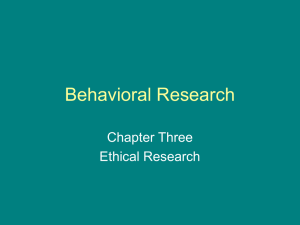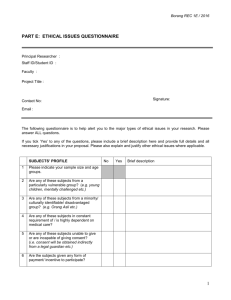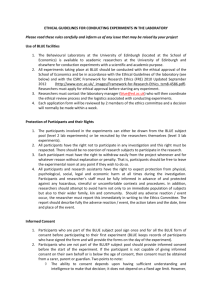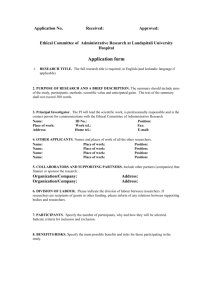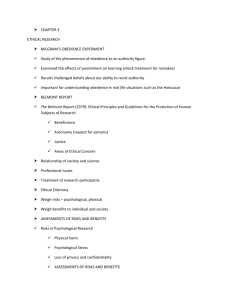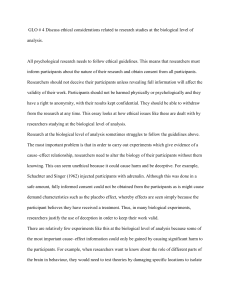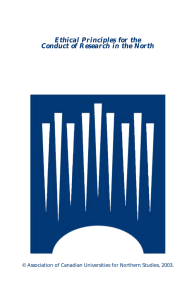Ethics in Psychology Research: Issues & Solutions
advertisement
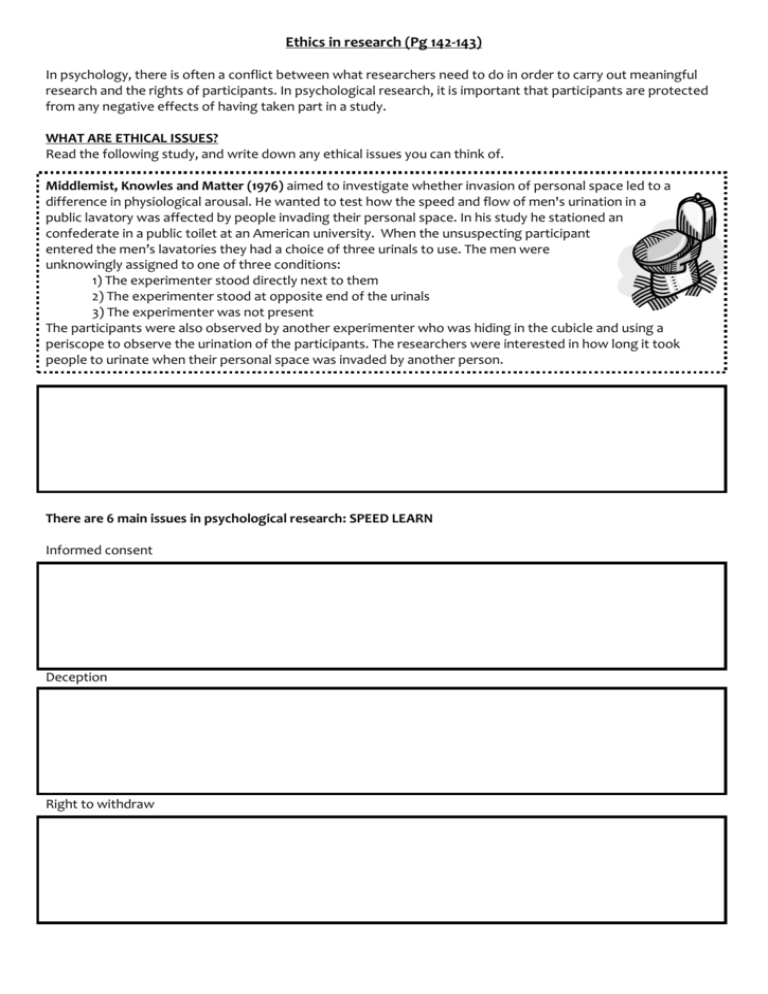
Ethics in research (Pg 142-143) In psychology, there is often a conflict between what researchers need to do in order to carry out meaningful research and the rights of participants. In psychological research, it is important that participants are protected from any negative effects of having taken part in a study. WHAT ARE ETHICAL ISSUES? Read the following study, and write down any ethical issues you can think of. Middlemist, Knowles and Matter (1976) aimed to investigate whether invasion of personal space led to a difference in physiological arousal. He wanted to test how the speed and flow of men's urination in a public lavatory was affected by people invading their personal space. In his study he stationed an confederate in a public toilet at an American university. When the unsuspecting participant entered the men’s lavatories they had a choice of three urinals to use. The men were unknowingly assigned to one of three conditions: 1) The experimenter stood directly next to them 2) The experimenter stood at opposite end of the urinals 3) The experimenter was not present The participants were also observed by another experimenter who was hiding in the cubicle and using a periscope to observe the urination of the participants. The researchers were interested in how long it took people to urinate when their personal space was invaded by another person. There are 6 main issues in psychological research: SPEED LEARN Informed consent Deception Right to withdraw Protection from physical and psychological harm Confidentiality Privacy Re-read the Middlemist study on the previous page. Which of these ethical issues does it raise? HOW TO DEAL WITH ETHICAL ISSUES? The British Psychological Society (BPS) produces a code of conduct for psychologists carrying out research. The aim of the guidelines is to help psychologists carry out ethical research and to protect participants. However, these guidelines have their limitations. Cut out the boxes on the next page and put them in the right place Issue How to deal with it Informed consent Participants are asked to formally agree to take part in a study (usually with a consent form) after being given comprehensive information about the nature and purpose of the study, and their role in it. Right to withdraw Limitations Participants may feel like they cannot leave as they don’t want to spoil the study. Deception Protection from harm Studies should be designed so that participants come to no more harm than they would do in their day to day lives. Confidentiality Researchers should use fake names or numbers instead of participant names. Privacy There is no universal agreement on what a public place is. Some people may still object to being observed in public. Can you think of a mnemonic to help you remember these 6 issues? (IRDPCP) TASK A. Read the following study, and describe any ethical issues you can see. [8] B. How could you overcome these ethical issues, and what problems could this cause? [4] Piliavn et al (1969) investigated the behaviour of bystanders in an emergency situation to see how quickly they would offer help to someone (a confederate of the study) who had collapsed on a New York underground train. The confederate acted either as if he were drunk (when he carried a bottle in a brown paper bag) or as if he were disabled (when he carried a black cane). Observers recorded how long it took for anyone to offer help. There was no opportunity to debrief participants. Researchers cannot always predict any potential harm that may occur until it happens, by which point it is too late. Sometimes it may be possible to work out who participants were on the basis of information contained in the study (geographical location for example) Researchers make it clear that participants are free to leave at any time during a study. If participants are being paid, they will still receive payment even if they withdraw Gain prior consent for observations where appropriate. Observations in public places are generally ok. However retrospective consent should be sought. If a participant has suffered stress or anxiety during a study due to deception, a debrief may not undo the damage which has already been done. If participants are deceived, they should be fully debriefed after the study. This is a short interview after where participants are told the full aims of the study and are given the opportunity to ask questions If participants are given too much information, it may invalidate the results of the study. Participants may agree to take part in the study, but still not completely understand what they have let themselves in for.



